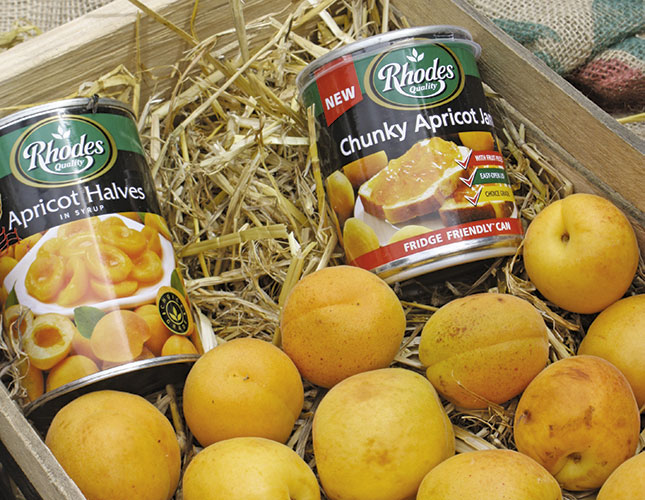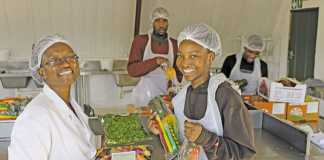
Photo: Denene Erasmus
It is the apricot harvest season and trees are heavy with fruit. Teams of pickers work swiftly as each intuitively follows the silent rhythm of the group. Just about to add a handful of apricots to her bucket, a worker is reprimanded. “Those are not ripe. Look at them. Would you eat them? If you won’t eat them, don’t pick them,” strict supervisor Martha Fielies says.
Quality, after all, is one of the most important rules. An experienced picker, Martha now owns a share and understands the importance of upholding quality. She is one of 183 woman farm workers from the Robertson area who have been given the opportunity to participate in an agricultural transformation initiative headed by Robertson Co-operative Winery Ltd.
Getting started
The idea for the project started with Robertson Winery’s cellar master Bowen Botha, who was inspired by a desire to see transformation in the wine industry. “Executing successful transformation projects is not an easy task in any of the agricultural industries, but the wine industry poses even more challenges than most because it is such a highly capital-intensive type of farming,” says Bowen.
For any transformation initiative in the industry to succeed, a large and committed support base has to be in place. “I suggested to the members of the co-operative, who are the producers supplying grapes to the winery, that we should combine our efforts and try to get one successful project off the ground.” All the producers, representing about 40 production units, bought into the idea and in 2003, started looking for a suitable farm.

“We decided that all woman workers on the farms would be the beneficiaries of the project. In 2005, after buying the farm, we approached government – the department of land affairs at the time – with our plan. It was impressed with the business plan and agreed to provide grants to 183 women, enabling them to buy a 66% share in the farm,” says Bowen.
Constitution Road Wine Growers (Pty) Ltd was established as the holding company through which the workers own 66% of the farm Klipdrift, near Robertson. The worker-shareholders in Constitution Road Wine Growers are represented by the Le Chasseur Workers’ Trust (21%), the Robertson East Workers Trust (26%) and the Robertson West Workers Trust (19%) along with Robertson Co-operative Winery Ltd which holds a 34% share. However, the shareholders’ agreement makes provision for the three trusts to eventually own all the shares in the company.
The farm
In 2003 when Robertson Winery first identified the 115ha Klipdrift farm, the property was a little run down. But since then, a lot has been invested to turn it into a commercially viable entity, says Briaan Stipp, Robertson Winery viticulturist. The farm now has 35ha wine grapes: 13,26ha Cabernet Sauvignon, 9,53ha Chardonnay, 5ha Pinotage, 4,65ha Shiraz and 2,25ha Merlot. All the grapes are delivered to Robertson Winery.
Through its ownership of the farm, Constitution Road Wine Growers holds membership in the co-operative. “We hope to plant an additional 20ha of vineyards within the next four to five years, by which time the farm should be fully developed,” says Briaan. About 13ha of the 35ha wine grapes is not yet in full production and as a result, the average yield for 2013 was just over 11t/ha.
Rhodes Food Group, a fast growing South African-based diversified foods business, became involved in the project a few years ago when it identified Constitution Road Wine Growers as a successful enterprise development initiative. The group’s human resources director, Job Mpele, explains that it supported the initiative by providing an interest free, long-term loan to the value of R1,45 million to establish 11ha apricot orchards and a 9,5ha peach orchard.
“We were eager to become involved with the project, because it is a sustainable, long-term land reform initiative which will eventually, significantly transform the lives of the beneficiaries,” says Job. He explains that the apricots produced on the farm are sold back to the group by prior agreement. The peach orchard was only planted in 2013 and will come into production in 2015, at which time it would also be sold back to the group. The average yield on apricots was about 40t/ ha for the 2013 harvest.
Cultivating patience
The beneficiaries are not yet receiving substantial direct financial benefit from the project. The business model indicated that the farm would only be profitable in 2017 and they are still on track to reach that target, Bowen says. Most of the proceeds generated from harvests to date had to be used to plant additional orchards and vineyards in order to increase overall yield.
According to Bowen, this was a difficult message to communicate to the beneficiaries who had little prior knowledge of how a business works and how difficult it is to turn a profit.
“There is a common misconception amongst many people that having land equates to having money in your pocket,” he says.
“We had to, very clearly, communicate to the beneficiaries that while owning land was certainly to their long-term financial benefit it would not necessary have an immediate impact on their livelihoods.” Speaking to Martha, it is evident that this message has been understood.
“It makes a big difference in a person’s life to know that you are the owner of a farm. Even though we have not thus far really benefitted financially, we remain patient. “We understand that we are now part of a long-term project that will eventually make a big difference in our and our children’s lives.”
As a result of the joint partnership, the women beneficiaries of the trusts receive technical and financial management training, and are supported by the winery in running and managing the farm. Bowen and Martha agree that even though the women have not yet profited, it remains an unfolding success story.
“Since 2005, the value of the farm has more than doubled from R5 million to about R12 million, which means that their main asset has increased in value,” says Bowen.
Transformation challenges
“The building blocks for successful transformation in any agricultural industry include having land, first of all, or enough capital to buy land; you need working capital to pay for all the necessary inputs and running costs; mentorship in terms of financial management and production management is crucial; and last but by no means least, you have to have a guaranteed market for you produce,” says Bowen.
He adds that the greatest challenge in transformation in this industry, and other high value crop industries, is that it needs a lot of start-up capital even when taking over a productive, fully developed farm. “To establish a transformation project such as Constitution Road Wine Growers you need access to at least four years’ worth of working capital to cover running costs, the cost of planting vineyards and other inputs.”
He points out that even if you take a fully developed and functional farm, and you hand it over to a group of beneficiaries to run, the nature of the industry dictates that they will still need access to about three years’ worth of working capital otherwise they will never make it. And this, he says, is what government often fails to understand and why so many land reform farms have failed.
Phone Robertson Co-operative Winery on 023 626 3059 or email [email protected]. Phone Job Mphele on
021 870 4000 or email [email protected].
This article was originally published in the 14 February 2014 issue of Farmer’s Weekly.













